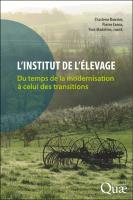L'Institut de l’Élevage
Du temps de la modernisation à celui des transitions
Author(s)
Bouvier, Charlène
Cornu, Pierre
Madeline, Yves
Language
FrenchAbstract
In the early 1960s, French livestock production was at a crossroads, having been disrupted by the impact of agricultural modernisation and European integration. Public authorities and professional representatives agreed to create a development apparatus dedicated to ruminant animal production, in order to facilitate the adoption of innovations resulting from research. This is how the Technical Institute for Cattle Breeding was founded in 1962 and the Technical Institute for Sheep and Goat Breeding in 1967. Initially, the missions of these institutes were limited to testing innovations on experimental farms and transferring knowledge, in line with the modernising measures set out in the 1966 law on livestock farming. However, faced with the great diversity of livestock systems and the growing challenges that they had to face, the agents of the technical institutes began, in the 1970s, to develop original methods to support livestock farmers. At first marginal, this know-how gained legitimacy in the face of the social, economic and finally ecological consequences of the race for innovation and competitiveness. Gathered together in 1991 in a single Institute of Animal Husbandry with cross-disciplinary skills, these agents found themselves confronted with major health crises and the cross-cutting issues of the digital revolution, the advent of genomics, new societal expectations and, above all, environmental issues, which became significant at the turn of the century. Support for the world of livestock farming can no longer be thought of solely in terms of development, it must also take into account the necessary transitions. Based on unpublished archives and the testimonies of men and women who have lived through and supported these changes, this book retraces the little-known history of an engineering department that has played a crucial role in the metamorphosis of French livestock farming, making an important contribution to the debate on the future of the relationship between livestock farming and society.
Keywords
farmer; agriculture; genetic improvement; cattle; goat; rural development; livestock; environment; genetics; history; sheep; public policy; animal production; sociologyDOI
10.35690/978-2-7592-3618-3ISBN
9782759236237, 9782759236183, 9782759236626, 9782759236237Publisher
éditions QuaePublication date and place
2022Classification
Animal breeding


 Download
Download